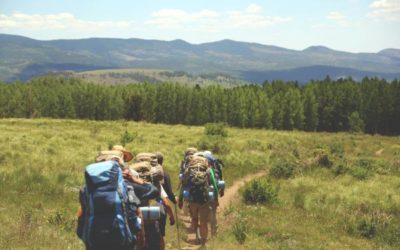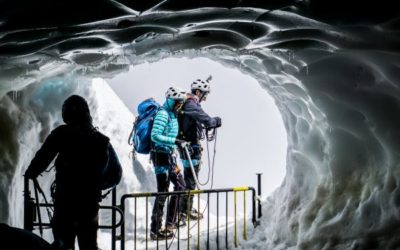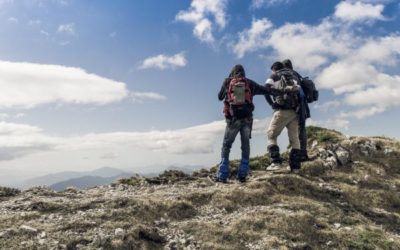G.K. Chesterton was a 20th century poet probably never tried mountaineering or backcountry skiing, but he wrote something that will make anyone think again if they haven’t placed much value on recreational pursuits. He writes…
It is the happy man who does the useless things; the sick man is not strong enough to be idle.
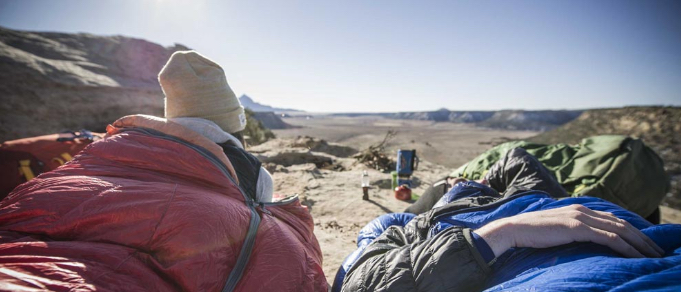
backcountry.com
Jesus Wants to Get You Away to be Alone with Him: This is Intentional Outdoor Recreation
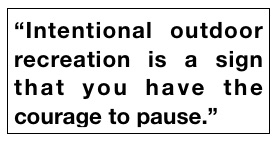 Chesterton hits on one of the deep secrets of why outdoor recreation is so transformational. Camping promotes a kind of courage that is sorely lacking in our society today. Intentional outdoor recreation is a sign that you have the courage to pause. Camping and outdoor recreation help you and I reject the cowardly idols of over work, over commitment, and over busyness. Life without margin is an indicator of a weakness, not strength.
Chesterton hits on one of the deep secrets of why outdoor recreation is so transformational. Camping promotes a kind of courage that is sorely lacking in our society today. Intentional outdoor recreation is a sign that you have the courage to pause. Camping and outdoor recreation help you and I reject the cowardly idols of over work, over commitment, and over busyness. Life without margin is an indicator of a weakness, not strength.
When we fear God, we align with his design for work and regular retreat. By contrast, when we fear man, we ignore our limitations and neglect our need for rest and leisure. Chesterton alludes to a remedy to this age old problem when he writes: “It is the happy man who does the useless things; the sick man is not strong enough to be idle.”
Well as much as a 20th century poet can help confront our lack of margin; his poetic perspective is not enough to justify regular retreats as a normal pattern in life. That’s where we need to turn to Jesus.
Jesus modeled regular rhythm of retreat to balance out his heavy work-load. For example, one time when he was de-briefing an intense time of work with his disciples, he pulled them away for a mini-retreat:
They left that place and passed through Galilee. Jesus did not want anyone to know where they were, because he was teaching his disciples. -Mark 9:30
I wonder, have you ever thought about the fact that Jesus would like to get time with YOU alone? He loves to get you all by himself so he can speak to you and minister to your specific and personal needs. Leaders especially need to be reminded to get away and recreate for the health of their souls. We even see in Jesus’ pattern that regular retreats are in fact a powerful platform for creative thought and strategic planning.
Still in the Dark
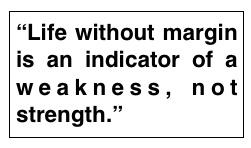 For example, one time after Jesus had an intense day of ministry in Capernaum… the next morning he awoke while it was still dark and went off to a secluded hillside to connect with the Father. When the disciples came to find him and announced that they had a plan for his life and it involved staying in Capernaum, Jesus announced, that as a result of his retreat away from the noise and expectations of the crowds, the Heavenly Father had given him some creative and strategic guidance. Then Jesus did what no one expected he should do. He left the city even though he had the whole town in the palm of his hand from the previous day of miraculous ministry. This made no sense to the disciples. This is one of the things that happens when we retreat or camp… creative thoughts and Kingdom strategies are often revealed because through the courage to pause we seek the Lord’s guidance.
For example, one time after Jesus had an intense day of ministry in Capernaum… the next morning he awoke while it was still dark and went off to a secluded hillside to connect with the Father. When the disciples came to find him and announced that they had a plan for his life and it involved staying in Capernaum, Jesus announced, that as a result of his retreat away from the noise and expectations of the crowds, the Heavenly Father had given him some creative and strategic guidance. Then Jesus did what no one expected he should do. He left the city even though he had the whole town in the palm of his hand from the previous day of miraculous ministry. This made no sense to the disciples. This is one of the things that happens when we retreat or camp… creative thoughts and Kingdom strategies are often revealed because through the courage to pause we seek the Lord’s guidance.
From observing Jesus pattern of regular retreat, we should not feel guilty for recreating. In fact, according to Chesterton, if we don’t recreate or build some leisure into our lives, this is actually a sign of cowardice and immaturity. “It is the happy man who knows how to recreate and be idle with God from time to time.
God has used the wilderness as a special place for transformation throughout all of history. And there is no reason to believe that he has somehow changed his mind in the modern era and made wilderness experiences irrelevant to one’s faith. In fact history affirms that wilderness experiences have intrinsic value. Jesus actually carried on the Old Testament pattern of using wilderness journeys for the purpose of transformation. The Apostle Paul then picked up that same baton and sojourned into the Arabian desert for a long period of time to recalibrate his understanding of the Gospel. The Desert Fathers then followed this pattern to offer prayer and intercession for a world that had become shipwrecked. And since then monks, missionaries, and common folk like you and me have found solace and strength through times of retreat and camping, untethered from the comforts of normal life.
Need for Planning and Decision Making? Intentional Outdoor Recreation = a Remedy
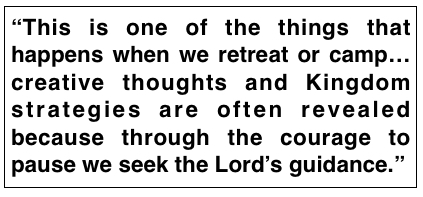 Are you planning for your future and trying to discern God’s calling on your life? All of us go through seasons of decision-making. And now more than ever with all of the information, options, and events we get invited to, we need time to step away and prayerfully plan out our life and priorities. Did you know that before just about every major decision Jesus had to make, he withdrew away from the crowds to be with the Father for a time of rest, reflection, prayer? Jesus was the master of intentional outdoor recreation. Lets look at a few examples…
Are you planning for your future and trying to discern God’s calling on your life? All of us go through seasons of decision-making. And now more than ever with all of the information, options, and events we get invited to, we need time to step away and prayerfully plan out our life and priorities. Did you know that before just about every major decision Jesus had to make, he withdrew away from the crowds to be with the Father for a time of rest, reflection, prayer? Jesus was the master of intentional outdoor recreation. Lets look at a few examples…
- In Luke 4:1-2, Before Jesus started his ministry, he went off to the desert for a time of extended prayer and preparation.:
Jesus, full of the Holy Spirit, left the Jordan and was led by the Spirit into the wilderness, where for forty days he was tempted by the devil.
2. In Luke 6:12-16, As Jesus was about to choose his inner circle of Disciples, he spent the night on a mountain praying before he chose his closest disciples to train to accomplish his mission:
One of those days Jesus went out to a mountainside to pray, and spent the night praying to God. When morning came, he called his disciples to him and chose twelve of them, whom he also designated apostles: Simon (whom he named Peter), his brother Andrew, James, John, Philip, Bartholomew, Matthew, Thomas, James son of Alphaeus, Simon who was called the Zealot, Judas son of James, and Judas Iscariot, who became a traitor.
3. In Luke 21:37, In preparation for the Last Supper Jesus would have with his disciples, before he passed the baton of leadership to them he prayerfully prepared for this moment.
Each day Jesus was teaching at the temple, and each evening he went out to spend the night on the hill called the Mount of Olives.
He retreated to the garden each evening in preparation for the intensity of spiritual conflict that was building up to a climactic point at the cross.
4. As Jesus Prepared to endure the Cross he went to the Garden of Gethsemane
Then Jesus went with his disciples to a place called Gethsemane, and he said to them, ‘Sit here while I go over there and pray.’ He took Peter and the two sons of Zebedee along with him, and he began to be sorrowful and troubled. Then he said to them, ‘My soul is overwhelmed with sorrow to the point of death. Stay here and keep watch with me.’ Going a little farther, he fell with his face to the ground and prayed, ‘My Father, if it is possible, may this cup be taken from me. Yet not as I will, but as you will.’ Matthew 26:36-39
5. The writer of Hebrews summarizes much of the Gospel writers stories of Jesus’ pattern of regular prayer before major life decisions and events when he writes:
In the days of his flesh, he offered up both prayers and supplications with loud crying and tears to the One able to save him from death, and he was heard because of his piety. Although he was a Son, he learned obedience from the things which he suffered. And having been made perfect, he became to all those who obey him the source of eternal salvation, being designated by God as a high priest according to the order of Melchizedek. Hebrews 5:7-10
God Uses Wilderness Time Draws out the Best in You
Wilderness journeys draw out the best in us by confronting our fears and exposing the traps of entitlement. Wilderness is the great leveler that prunes out the unfruitful branches of our lives and inoculates us with a deep gratefulness for even the small things. Take a sleeping bag for example. Is there anything better after a long day of hiking, as night falls and the cold winds begin to wisp through your camp, to go into your tent and slide into your warm sleeping bag for a long night’s rest? Wilderness time makes you thankful for the small things. As you thank God for the small things, your character enlarges.
Why is outdoor ministry valuable? Wilderness experiences will sever those idolatrous entanglements in your life that are strangling out God’s epoch vision for your life. Jesus recognized the need for regular retreat, leisure, and recreation. If he needed it, who are we to think that we have any less of a need? So don’t feel guilty for building margin into your life for regular retreat.

In closing, let me highlight one more epic Old Testament leader for a moment. I think most of us would acknowledge Moses as one of the best leaders of all time, right. And he spent a lot of time in the wilderness. If Moses were alive today, he would be crying out, “Let My People Go Camping.” Lets follow the lead of the patriarchs, the prophets, the disciples, and our Lord Jesus and build into our lives a regular rhythm of retreat. This is intentional outdoor recreation. Embracing your limitations will actually broaden your horizons, not shorten them. Any time you align with God’s design, reward will soon follow. This is why I believe outdoor ministry has a vital role in society today. Amen.
Reflection Questions
- Are you living by priorities right now?
- Do you have a good plan for your life with adequate margin for rest and recreation?
- Plan a day or two of intentional recreation in the next month where you will spend several hours in solitude soaking in the beauty and listening to your Good Shepherd offering you guidance that you need.
